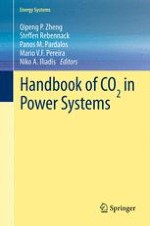2012 | OriginalPaper | Buchkapitel
Modeling the Costs of Carbon Capture
verfasst von : Erin Baker, Gregory Nemet, Peter Rasmussen
Erschienen in: Handbook of CO₂ in Power Systems
Verlag: Springer Berlin Heidelberg
Aktivieren Sie unsere intelligente Suche, um passende Fachinhalte oder Patente zu finden.
Wählen Sie Textabschnitte aus um mit Künstlicher Intelligenz passenden Patente zu finden. powered by
Markieren Sie Textabschnitte, um KI-gestützt weitere passende Inhalte zu finden. powered by
